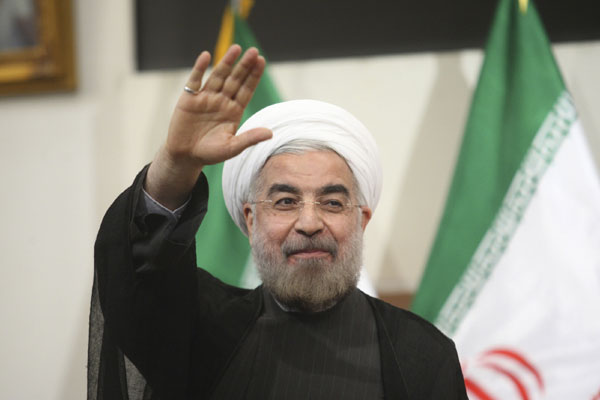

In a Tuesday telephone conversation with Iranian President Hassan Rouhani, President Xi Jinping urged the Iranian side to seize the opportunity, maintain the momentum of dialogue, seek the largest possible common ground, and strive for the best possible outcomes in the new round of Geneva talks on its nuclear program.
His Iranian counterpart, in return, placed high hopes on a constructive Chinese role in brokering a mutually beneficial and win-win deal at the upcoming talks between the Islamic republic and the P5+1 countries.
 |
|
Iranian President-elect Hassan Rouhani gestures to the media during a news conference in Tehran in this June 17, 2013 file photo. [Photo/Agencies] |
Also Tuesday, Rouhani talked on the phone with British Prime Minister David Cameron, breaking the silence between leaders of their countries that had lasted more than a decade. During their conversation, the two stated their shared interest in sustaining the latest progress in negotiations in Geneva.
These are credible signs that an agreement can be reached. Ignoring such a hard-earned window of opportunity, which the Iranians say would not be available indefinitely, does no good to any party.
If the current talks in Geneva, which are one small step shy of unanimous endorsement, end again without a deal, it would be a loss to all.
Impressive headway was made in the last round of negotiations, and President Rouhani and his government have offered evidence that the Iranian desire for a resolution is not just rhetoric.
On the heel of the last round of negotiations, Iran agreed to grant International Atomic Energy Agency inspectors access to two nuclear-related facilities.
Days later, the IAEA inspection report confirmed that since August, when Rouhani assumed the presidency, Iran has stopped expanding its uranium enrichment capacity. No further major components have been added to a potential plutonium-producing reactor at the center of Western concerns. Or in the report's words, construction has been "more or less frozen" at the facility.
Washington seems to have recognized such prominent moves on Teheran's part are the result of decisions, not technical difficulties.
The Iranians need a deal in Geneva. But they are not the only ones who need it. The P5+1 countries want a comprehensive, permanent agreement that guarantees Iran remain nuclear weapon free. For that purpose, they must work with Teheran on reaching an interim deal.
(China Daily 11/21/2013 page8)